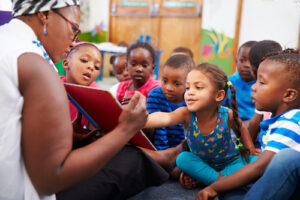
This story was originally published by Chalkbeat. Sign up for their newsletters at ckbe.at/newsletters.
Twelve years ago, when I left a career as a lawyer to become a history teacher, my vision of what a “good teacher” looked like was shaped in part by movies, such as “Stand and Deliver” and “To Sir, With Love,” which depict teachers who overcome institutional dysfunction to connect with students and inspire them to achieve their potential.
Watching “To Sir, With Love” was even a course requirement in my teacher residency program. It was with great trepidation — knowing that I could not live up to this model but wanting to do my best — that I took my job teaching social studies at a small public high school in the Bronx.
I spent the next decade at that same small school, and my time there reshaped my view of what makes a good teacher. The movie model, I learned, underplays the extent to which a school’s success depends on collaboration and on an interconnected web of complementary skills of teachers and school staff.
No one can be all things to all students, yet all students need love and a reason to show up. This requires a team capable of providing academic skills and content as well as consistency, emotional support, extracurricular activities, and so much more.
Who is needed on this team? I expected the obvious: general content teachers, teachers who work with English language learners and students with disabilities, counselors, social workers, paraprofessionals, and other support staff. In practice, I found that what is really needed is staff who can learn from each other and how to support each other.
Last year, as I watched my co-teacher quickly defuse a cranky student with humorous banter — a skill I never did acquire — I appreciated again how much a school needs these different strengths. His action allowed me to calmly steer all the students back to the history lesson at hand. While I benefited from his deep connection with our students, other teachers learned from my organizational skills, which I used to map out curriculum, break down standards, and track student progress.
Schools, I’ve learned, need teachers who are adept at differentiating instruction for individual learning needs, tutoring small groups, and instructing dozens of students for multiple periods in a single day without a break between classes. They need teachers who know the latest scholarship and those who know the latest social media platforms. They need teachers with physical and mental endurance, but they also need teachers who struggle physically or emotionally. There are lessons that cannot be explicitly taught.
They need teachers and staff who can anticipate and prevent conflicts from happening, those who will jump in to contain a fight, those who can calm a classroom after a conflict raises adrenaline and brings everyone close to an emotional edge, and those who can mediate conflict afterward, bringing healing to the whole community.
Schools need teachers with high expectations and teachers with a deep, personal knowledge of the stresses and life experiences that can make it difficult for children to get to school in the morning and live up to their potential.
They need school staff who speak the home languages of the students and teachers who reflect the students’ ethnic, religious, and racial backgrounds. They need educators who are willing to reflect on their own assumptions, privileges, and biases, and those who are adept at leading others in that process. They need teachers who are not afraid to have hard conversations with students about class, race, gender, and other challenging subjects, and who know how to create productive spaces for them to occur.
Schools need staff members with connections to other professionals, the community, and those in the trades. They need those willing to organize school-wide events that build a sense of belonging, and those who will organize field trips even when funding or transportation pose challenges.
They need teachers with naturally loud voices that can reach across a classroom or outdoor space, and they need those who talk softly and force the students to learn to listen more attentively. They need introverts and extroverts.
They need teachers and staff members who recognize neglect, hunger, and abuse, and those who recognize a student’s hidden genius as a writer, philosopher, artist, poet, or engineer. They need teachers who know when to quietly bring a box of tissues, when to text a counselor or consult a social worker, and how to build trust with a student.
They need teachers who laugh and those who make the students laugh. They need teachers who can laugh at themselves.
It took time for me to fit into the web of my small school. What ultimately made me a good teacher there was recognizing and drawing upon my own strengths and the strengths of my colleagues. Supplementing individual performance reviews with celebrations of teamwork among school staff could result in happier and healthier workplaces and reduce teacher turnover.
I never did replicate the movie model, but I found in my colleagues the strength and skills to give my best to my students. Although I left teaching reluctantly in June due to the accumulated strain of the work, which increased astronomically after COVID, and the commute, it was especially hard to leave my fellow educators.
This is my love letter and thank you note to my former colleagues. It is also a plea that we do more to acknowledge all of the amazing people who, working together, make a school a good place to learn and grow.
Chalkbeat is a nonprofit news organization covering public education.
Related:
Investing in mentorship can help the teacher retention crisis
Empowering educators through holistic teacher PD
For more news on teacher PD, visit eSN’s Educational Leadership page
- SEO Powered Content & PR Distribution. Get Amplified Today.
- PlatoData.Network Vertical Generative Ai. Empower Yourself. Access Here.
- PlatoAiStream. Web3 Intelligence. Knowledge Amplified. Access Here.
- PlatoESG. Carbon, CleanTech, Energy, Environment, Solar, Waste Management. Access Here.
- PlatoHealth. Biotech and Clinical Trials Intelligence. Access Here.
- Source: https://www.eschoolnews.com/educational-leadership/2023/12/13/the-secret-to-good-teaching-teamwork/
- :is
- :not
- $UP
- 10
- 12
- 2013
- 2023
- 28
- a
- About
- abuse
- academic
- Accumulated
- Achieve
- acknowledge
- acquire
- across
- Action
- activities
- adept
- adrenaline
- afraid
- After
- again
- ago
- All
- allowed
- also
- Although
- amazing
- among
- an
- and
- anticipate
- ARE
- artist
- AS
- assumptions
- At
- author
- back
- backgrounds
- BE
- become
- belonging
- BEST
- between
- biases
- Box
- Break
- bring
- Bringing
- Brings
- build
- build trust
- but
- by
- CAN
- cannot
- capable
- Career
- celebrations
- challenges
- challenging
- Children
- City
- class
- classes
- classroom
- Close
- collaboration
- colleagues
- community
- Commute
- complementary
- conflict
- conflicts
- Connect
- connection
- Connections
- contain
- content
- contributors
- conversations
- Coordinator
- could
- course
- covering
- Covid
- create
- Curriculum
- day
- decade
- deep
- depends
- description
- DID
- different
- difficult
- disabilities
- do
- down
- dozens
- drawing
- due
- during
- dysfunction
- each
- Edge
- Education
- educators
- engineer
- English
- especially
- Even
- events
- everyone
- expectations
- expected
- Experiences
- explicitly
- extent
- fellow
- field
- fight
- fit
- For
- Force
- Former
- found
- from
- funding
- Gender
- General
- genius
- get
- Give
- Global
- good
- great
- Group’s
- Grow
- hand
- Happening
- happier
- Hard
- Have
- healing
- healthier
- help
- Hidden
- High
- his
- history
- holistic
- Home
- How
- How To
- http
- HTTPS
- hunger
- i
- in
- increased
- individual
- inspire
- Institutional
- interconnected
- into
- IT
- Job
- jump
- june
- Know
- Knowing
- knowledge
- language
- Languages
- latest
- laugh
- lawyer
- leader
- leading
- LEARN
- Learn and Grow
- learned
- learners
- learning
- Leave
- left
- lesson
- Lessons
- letter
- Life
- like
- live
- looked
- loud
- love
- made
- make
- MAKES
- map
- me
- Media
- Members
- mental
- Mentorship
- model
- more
- morning
- movie
- Movies
- much
- multiple
- my
- Need
- needed
- needs
- never
- New
- New York
- new york city
- news
- Newsletters
- next
- Nonprofit
- note
- obvious
- occur
- of
- on
- ONE
- or
- organization
- organizational
- Other
- Others
- our
- out
- Outdoor
- Overcome
- own
- part
- People
- performance
- periods
- personal
- physical
- Physically
- Place
- Platforms
- plato
- Plato Data Intelligence
- PlatoData
- Posts
- potential
- practice
- prevent
- privileges
- process
- productive
- professionals
- Program
- programme
- Progress
- providing
- public
- quickly
- quietly
- Race
- raises
- reach
- really
- reason
- recognize
- recognizing
- reflect
- requirement
- requires
- result
- retention
- Reviews
- same
- School
- Schools
- Secret
- sense
- served
- shaped
- she
- show
- sign
- single
- Sir
- skill
- skills
- small
- So
- Social
- social media
- social media platforms
- Space
- spaces
- speak
- spent
- Staff
- standards
- steer
- Story
- strength
- strengths
- Struggle
- Student
- Students
- studies
- success
- such
- support
- Talk
- taught
- teacher
- teachers
- Teaching
- team
- teamwork
- text
- thank
- that
- The
- their
- Them
- themselves
- There.
- These
- they
- things
- this
- those
- Through
- time
- tissues
- to
- together
- took
- track
- trades
- transportation
- Trust
- Tutoring
- Ultimately
- upon
- used
- View
- vision
- Visit
- VOICES
- wanting
- was
- we
- web
- WELL
- What
- What is
- when
- which
- while
- WHO
- whole
- will
- willing
- with
- without
- Work
- worker
- workers
- working
- writer
- year
- years
- yet
- york
- you
- zephyrnet












